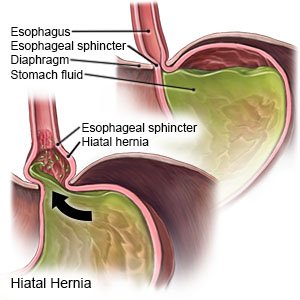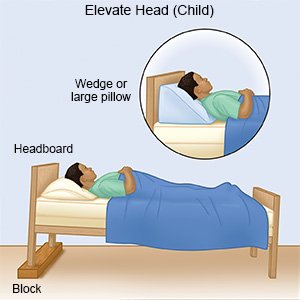Hiatal Hernia in Children
Medically reviewed by Drugs.com. Last updated on May 6, 2024.
What is a hiatal hernia?
A hiatal hernia is a condition that causes part of your child's stomach to bulge through the hiatus (small opening) in the diaphragm. This part of the stomach may move up and down, or it may get trapped above the diaphragm. Your child may have been born with a large or weak hiatus, or with the hiatal hernia.
 |
What are the types of hiatal hernia?
- Type I (sliding hiatal hernia): A portion of the stomach slides in and out of the hiatus. This type is the most common and usually causes gastroesophageal reflux disease (GERD). GERD occurs when the esophageal sphincter does not close properly and causes acid reflux. The esophageal sphincter is the lower muscle of the esophagus.
- Type II (paraesophageal hiatal hernia): Type II hiatal hernia forms when a part of the stomach squeezes through the hiatus and lies next to the esophagus.
- Type III (combined): Type III hiatal hernia is a combination of a sliding and a paraesophageal hiatal hernia.
- Type IV (complex paraesophageal hiatal hernia): The whole stomach, the small and large bowels, spleen, pancreas, or liver is pushed up into the chest.
What are the signs and symptoms of a hiatal hernia?
The most common symptom is heartburn. This usually occurs after meals. Your child may also have any of the following:
- Abdominal pain, especially in the area just above your child's bellybutton
- Burping or hiccups that happen often
- Vomiting or spitting up
- Coughing or hoarseness
- Not eating well because of fullness or bloating
- Poor growth
- Dark bowel movements
- Breathing problems such as wheezing
- Lung infections such as pneumonia that happen often
How is a hiatal hernia diagnosed?
- An upper GI series test includes x-rays of your child's esophagus, stomach, and small intestines. It is also called a barium swallow test. Your child will be given barium (a chalky liquid) to drink before the pictures are taken. This liquid helps your child's stomach and intestines show up better on the x-rays. An upper GI series may show an ulcer, a blocked intestine, or other problems.
- An endoscopy uses a scope to see the inside of your child's digestive tract. A scope is a long, bendable tube with a light on the end of it. A camera may be hooked to the scope to take pictures.

- Esophageal manometry measures the pressure within your child's esophagus and stomach.
- Esophageal pH monitoring measures how much acid is in your child's stomach. A small probe is placed inside the esophagus and stomach to check the pH of your child's stomach acid. This test also measures the amount of acid that goes into your child's esophagus.
How is a hiatal hernia treated?
Your child's hiatal hernia may go away on its own if it is diagnosed during infancy. Any of the following may be used to treat a hiatal hernia or the symptoms it causes:
- Medicines may be given to relieve heartburn symptoms. These medicines help to decrease or block stomach acid.
- Surgery may be done when medicines cannot control your child's symptoms, or other problems are present. Your child's healthcare provider may also suggest surgery depending on the type of hernia your child has. A surgeon can put your child's stomach back into its normal location. The surgeon may make the hiatus (hole) smaller and anchor your child's stomach in the abdomen. Fundoplication is a surgery that wraps the upper part of your child's stomach around the esophageal sphincter to strengthen it.
Treatment options
The following list of medications are related to or used in the treatment of this condition.
- omeprazole
- famotidine
- lansoprazole
- aluminum hydroxide/magnesium hydroxide/simethicone
- aluminum hydroxide/magnesium trisilicate
How can I manage my child's symptoms?
The following nutrition and lifestyle changes may be recommended to relieve symptoms of heartburn:
 |
- Do not give your child food or liquids that make the symptoms worse. These include spicy foods, fruit juices, caffeine, chocolate, and mint.
- Give your child several small meals during the day. Small meals give the stomach less food to digest.
- Tell your child not to lie down or bend forward after eating. Do not allow your child to eat meals 2 to 3 hours before bedtime. This will decrease the risk for reflux.
- Help your child achieve or maintain a healthy weight. If your child has excess weight, weight loss may help relieve some symptoms.
- Keep your child's head and upper body elevated at least 6 inches during sleep. Ask your child's healthcare provider how to do this safely. Do not put pillows under a young child's head.

Call your local emergency number (911 in the US) if:
- Your child has severe chest pain and sudden trouble breathing.
When should I seek immediate care?
- Your child has severe abdominal pain.
- Your child's bowel movements are black or bloody.
- Your child's vomit looks like coffee grounds or has blood in it.
When should I call my child's doctor?
- Your child's symptoms are getting worse.
- Your child has nausea and is vomiting.
- Your child is losing weight.
- You have questions or concerns about your child's condition or care.
Care Agreement
You have the right to help plan your child's care. Learn about your child's health condition and how it may be treated. Discuss treatment options with your child's healthcare providers to decide what care you want for your child. The above information is an educational aid only. It is not intended as medical advice for individual conditions or treatments. Talk to your doctor, nurse or pharmacist before following any medical regimen to see if it is safe and effective for you.© Copyright Merative 2024 Information is for End User's use only and may not be sold, redistributed or otherwise used for commercial purposes.
Learn more about Hiatal Hernia
Treatment options
Care guides
Symptoms and treatments
Further information
Always consult your healthcare provider to ensure the information displayed on this page applies to your personal circumstances.
